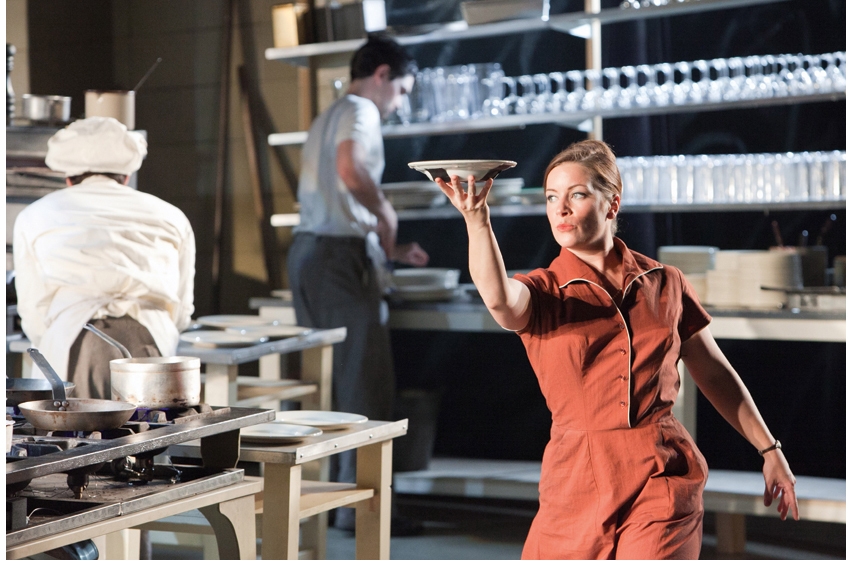Well done, the Royal Court. It’s got the art of audience abuse down to a tee. The queue for the tiny studio theatre snakes up an airless flight of stairs and bottlenecks into a doorway where each play-goer receives a personalised earbashing from an usherette. ‘Hello, did you hear all that? It’s one hour straight through. No readmission. No recording. No photography. No mobile phones. No sitting on the reserved chairs. No treading on the floor on the way to your seat. Enjoy the show. Hello, did you hear all that…?’ and so on.
The floor we mustn’t tread on is strewn with a layer of sacred grit which the director insists will remain untouched by human sole before the show begins. It’s a strange start (and a lot of play-goers scuff up the crunchy sprinklings by accident). But being treated as an intrusive vandal whose sense of pleasure needs to be torpedoed on arrival has the advantage of lowering one’s expectations.
The play, Truth and Reconciliation, is the brainchild of debbie tucker green, a writer who dwarfs the initials of her name in a show of power-crazed meekness. Her script is heavy on the air miles. We flit between six or seven troubled locations — South Africa, Rwanda, Ulster, Bosnia, etc. — and we meet traumatised families as they prepare to hear terrible truths about their murdered loved ones. Mundane details are the focus. A nervy couple bicker pointlessly. A bereaved granny whines about her hard chair. A morose teenager smokes with frantic anxiety. The aim is to illuminate great suffering through everyday superficialities. It’s like war photography reproduced on stage. Fair enough. But we get the idea after two minutes. Then the show gets scratched-record repetitive.
And because we know nothing of the characters, apart from their aching bums and frantic fag-puffing, we’re disinclined to give a toss about them. A stronger shape, and a smaller geographical range, might have helped. The script uses Pinter’s narrative device of concealing key details in order to maintain our interest. Artfully deployed, this technique works brilliantly (it’s called ‘suspense’ in thrillers and mysteries), but here it seems random and crude, a mannerism rather than a display of honed artifice.
It’s a shame to see such a precious, smug and self-regarding shred of a play from the pen of debbie tucker green. Talent isn’t something she lacks. She’s an angry little soul, with a wonderful ear for violent dialogue, but someone has persuaded her she’s a Significant Artist. This has cost her any chance of creating significant art. If she sat down and wrote a good old gangland drama she’d probably have a hit on her hands. The Royal Court should accept much of the blame for letting her write, and direct, this wafer-thin essay in off-beat grief. A cast of six actors, maximum, would have sufficed. The production has 22 (each adding about a thousand quid to the budget even before a penny has come in at the box office). If the Court is overfunded it should put seed money into try-out shows rather than blowing it all on one creaky, freaky firework.
A read-through at the Court in 1959 was the birthplace of Arnold Wesker’s classic, The Kitchen (currently revived at the Olivier). It found favour with the management and they gave it a run in the main house. Wesker was a cheeky little pup in those days and his idea was to show the Court’s privileged theatre-and-dinner audience the realities that lay behind their pampered lives. The stage became a kitchen. The actors became chefs. And the audience watched the hurly-burly of life below stairs.
In those days, documentaries were brand-new. Five decades, and a billion soap operas later, this is a snooze cruise. Wesker is so smitten with his mischievous prank that he ditches all the usual elements of theatre, a single hero, a credible predicament, a focused narrative, and so on. He just lays on a Frith-like cavalcade of frenetic bustle and hustle and a slender plot-ette that culminates in one of the nuttier chefs having a Basil Fawlty moment and attacking the crock cupboard with a meat cleaver. It’s a long wait to see some saucers getting smashed.
Bijan Sheibani’s production is spirited, stylish and done with quasi-military discipline. And Giles Cadle’s set is an accomplished symphony in red, silver and beige. But there’s a strange carnival atmosphere here. Lots of exuberant touches, freeze-frame interludes, mannered dances and acrobatic waitresses swinging above the set on wires. It’s as if the producers twigged that the meagre dramatic substance needed to be amplified with chirpy distractions. It makes for a valedictory mood, a sense of elegiac merriment. Everyone knows that this fuzzy old antique will never appear at the Olivier, or perhaps on any stage, again.






Comments